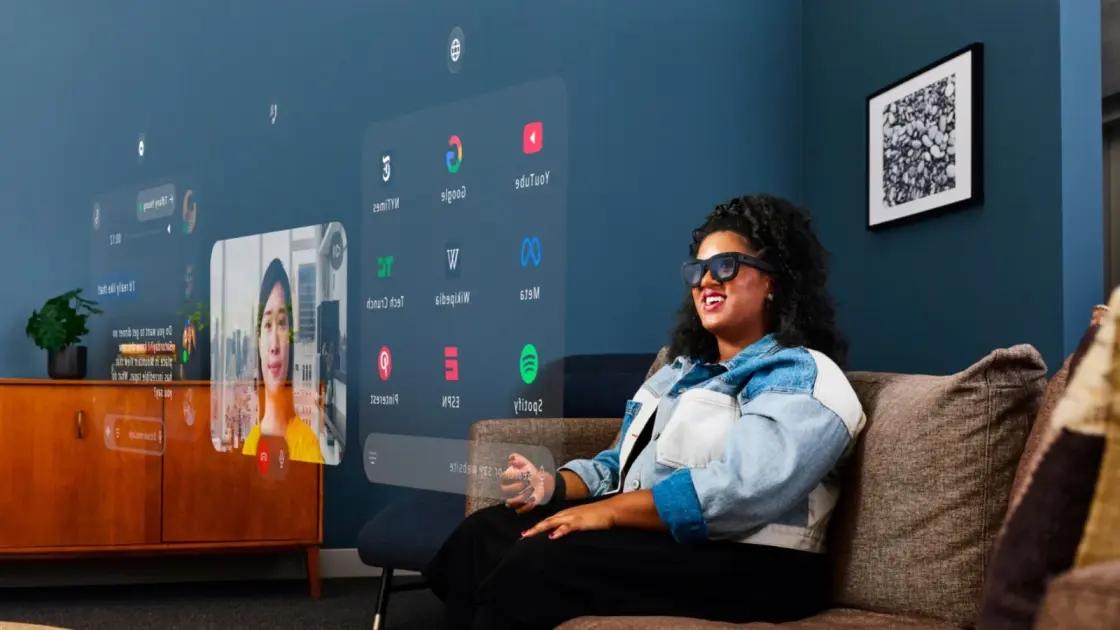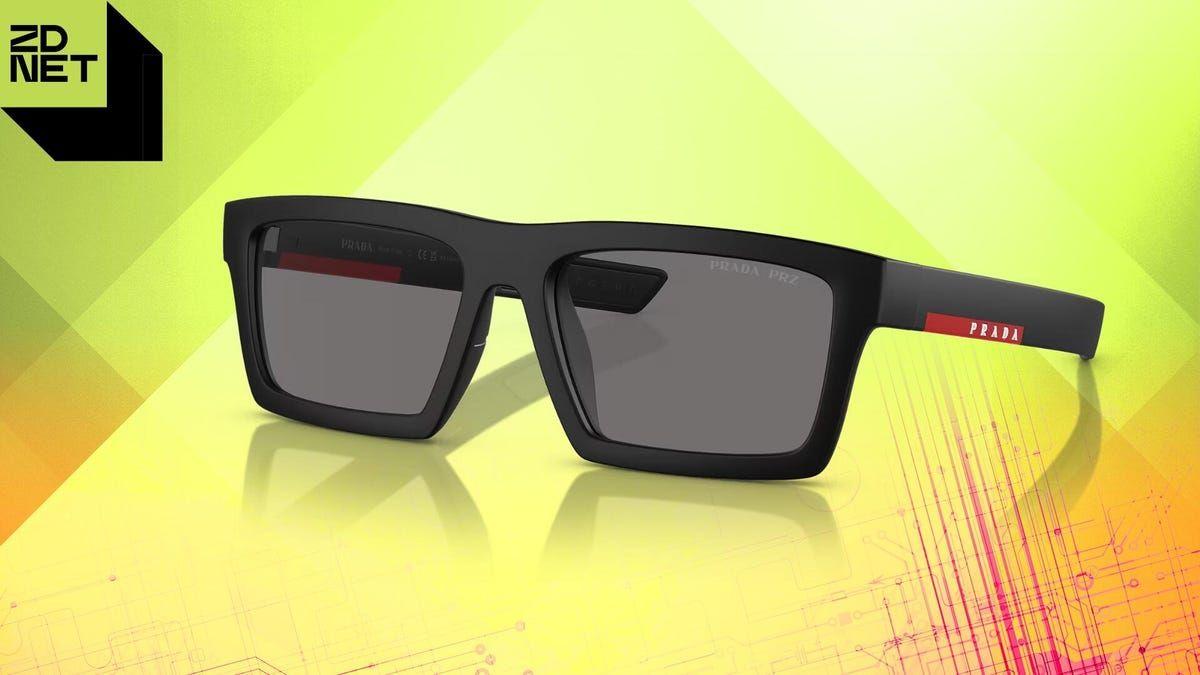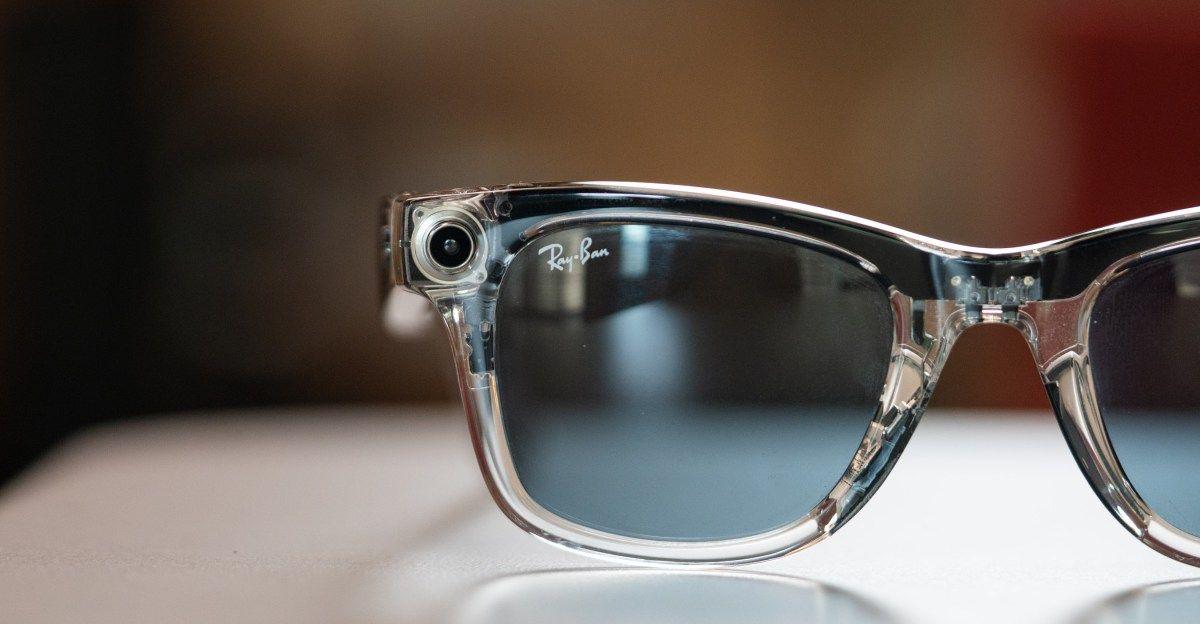Meta's 'Hypernova' Smart Glasses with Built-in Display Set for September Launch
7 Sources
7 Sources
[1]
Meta's Smart Glasses With Built-In Display May Launch Next Month
Meta's display-equipped smart glasses may launch next month and cost less than previous estimates, Bloomberg's Mark Gurman reports. The wearable, codenamed Hypernova, has been rumored for some time. It is expected to be a high-end version of Ray-Ban Meta Smart Glasses, with a small display at the bottom of the right lens. The display will only be visible to the wearer, and it can be controlled using a wrist accessory called Ceres -- something Meta first teased in 2022. Additionally, the device will use a Qualcomm chip and run a customized version of Android. On the home screen, users would see apps laid out horizontally, with dedicated ones for camera, gallery, and AI. For smoother navigation, the device will also have capacitive touch controls on either side of the glasses. In April, Gurman reported this wearable could cost anywhere between $1000 and $1400 at launch, but that's not the case anymore. Sources familiar with the development tell Gurman that Meta has slashed the prices significantly to boost demand. Hypernova will now start at $800, the same as the iPhone 16. Those who need style variations and prescription lenses, however, will have to pay for those separately. Additionally, the earlier report offered only a vague timeline, suggesting a launch sometime this year. The new report is more specific, with Gurman saying it will be "unveiled next month." The report arrives close to two months after Meta launched its first Oakley-branded Smart Glasses. Starting at $499, the alternative has a spec bump over the Ray-Ban Smart Glasses ($200-$400) and they're designed to boost athlete performance. Meta is also working on Project Orion. Previewed at last year's Meta Connect conference, the smart glasses fold the benefits of the Quest 3 VR headsets into a more lightweight and fashionable piece of eyewear. CEO Mark Zuckerberg has touted the wearable as the future of computing and the "most advanced glasses that the world has ever seen."
[2]
Meta set to unveil first consumer-ready smart glasses with a display, wristband next month
Meta CEO Mark Zuckerberg makes a keynote speech at the Meta Connect annual event at the company's headquarters in Menlo Park, Calif., on Sept. 25, 2024. Meta is planning to use its annual Connect conference next month to announce a deeper push into smart glasses, including the launch of the company's first consumer-ready glasses with a display, CNBC has learned. That's one of the two new devices Meta is planning to unveil at the event, according to people familiar with the matter. The company will also launch its first wristband that will allow users to control the glasses with hand gestures, the people said. Connect is a two-day conference for developers focused on virtual reality, AR and the metaverse. It was originally called Oculus Connect and obtained its current moniker after Facebook changed its parent company name to Meta in 2021. The glasses are internally codenamed Hypernova and will include a small digital display in the right lens of the device, said the people, who asked not to be named because the details are confidential. The device is expected to cost about $800 and will be sold in partnership with EssilorLuxottica, the people said. CNBC reported in October that Meta was working with Luxottica on consumer glasses with a display. Meta declined to comment. Luxottica, which is based in France and Italy, didn't respond to a request for comment. Meta began selling smart glasses with Luxottica in 2021 when the two companies released the first-generation Ray-Ban Stories, which allowed users to take photos or videos using simple voice commands. The partnership has since expanded, and last year included the addition of advanced AI features that made the second generation of the product an unexpected hit with early adopters. Luxottica owns a number of glasses brands, including Ray-Ban, and licenses many others like Prada. It's unclear what brand Luxottica will use for the glasses with AR, but a Meta job listing posted this week said the company is looking for a technical program manager for its "Wearables organization," which "is responsible for the Ray-Ban AR glasses and other wearable hardware." In June, CNBC reported that Meta and Luxottica plan to release Prada-branded smart glasses. Prada glasses are known for having thick frames and arms, which could make them a suitable option for the Hypernova device, one of the people said.
[3]
Meta smart glasses with a built-in display might cost as much as an iPhone
The "Hypernova" smart glasses will run a customized version of Android. See where this is going, right? Over the past few years, XR devices have exploded in popularity, and while at it, the costs have also gone up dramatically as the underlying tech keeps pushing new boundaries. For example, Apple's Vision Pro costs $3,500, while the Meta Quest Pro hit the shelves at $1,500. Smart glasses, especially those with a built-in display unit, are also slowly climbing up the price ladder. It seems Meta will buck that trend, or at least beat initial estimates for its next-gen smart glasses that are set to arrive later this year. "Meta recently figured out a way to slash the price for consumers down to about $800, I'm told. The move stems in part from the company accepting lower margins to boost demand -- a common tactic for new products," says a report by Bloomberg. How do Meta's smart glasses work? Currently in development under the codename "Hypernova," Meta had initially planned to hawk the smart glasses at roughly $1,000, while some estimates put the price at $1,400. With the purported $800 asking price, it seems Meta is essentially matching the iPhone 16's sticker value in the market, and possibly, the upcoming iPhone 17, as well. It's pretty obvious that Meta will push these glasses as the next-gen personal computing device, one that is an alternative to smartphones, especially the ubiquitous iPhones in its home market. For comparison, display-equipped smart glasses made by the likes of Xreal and Viture usually fall in the $400-600 bracket, and so do next-gen AI glasses with optical projectors, such as the Even G1. Recommended Videos Meta is essentially pulling off the same formula as Google Glass. Instead of a dual-display system that you will find on smart glasses sold by RayNeo, Viture, and Xreal, Meta's "Hypernova" smart glasses will only feature a monocular display fitted in the lower portion of the right lens. "Information will only be displayed in front of the wearer's right eye and will appear most clearly when they are looking downward," says a Bloomberg report. Powered by Qualcomm silicon, the upcoming Meta smart glasses will feature apps for capturing photos, viewing media, launching maps, and checking notifications. How can they stand out? For more intuitive controls, Meta will reportedly offer a neural wristband that will allow users to control the glasses using wrist gestures and hand movements. Smartwatches such as the Samsung Galaxy Watch 8 have already implemented a gesture-based system for navigating the UI. Notably, the wristband will come bundled in the retail package of the "Hypernova" smart glasses. Interestingly, the glasses will run a customized version of Android, though there might not be a dedicated app store installed on the wearable. Controls will reportedly be handled by a mix of tap and swipe inputs on the side frame. This is going to be a huge driving force for adoption if Meta and Google can somehow figure out a way to at least access and respond to app notifications coming from your connected phone. But it appears that Meta won't let Google enjoy that cake, especially with Google already working on its own AR glasses built atop the Android XR platform. "The new version will continue to rely heavily on the Meta View phone app," reports Bloomberg. The Hypernova smart glasses are expected to arrive in a month from now, and it would be worth waiting to see how they explore AI integration when compared to Google's Gemini on the wearable platform.
[4]
Meta's Next Generation of Smart Glasses May Be Coming in September (and Cost Less Than Expected)
A mass market success here could pave the way for Meta to dominate the smart glasses market in the future. Meta's next generation of smart glasses may be coming sooner than expected, and for less cash too. According to Bloomberg's Mark Gurman, Meta is planning to release smart glasses with a built-in display by the end of September, and the company is aiming at an $800 price-point for the next-gen specs. The glasses, code-named "Hypernova," will reportedly offer all the features of Meta's Ray-Ban and Oakley shades, but with a dedicated display for alerts and mini-apps, visible to the user on one part of the right lens, and controlled through a wristband. Reportedly, Hypernova glasses will feature apps for taking photos, and viewing media, maps, and notifications. These aren't the full augmented reality glasses the company is developing; they're more like a step between Meta's current AI-and-audio focused spectacles and the AR future. Previous predictions put the price of these glasses at between $1,000 and $1,400, but according to Gurman's report, Meta plans to set the bottom price at $800, settling for slimmer profits in exchange for greater demand. For comparison, an Apple iPhone 16 retails for around the same price as Hypernovas, a pair of Meta Ray-Bans starts at $299, and XReal's One Pro smart glasses retail for $649. The relatively inexpensive price is significant. It's a signal that Meta is aiming for the mass-market as opposed to enthusiasts looking for a cutting-edge, high-cost device like the Apple Vision Pro. Whether $800 smart glasses can break out of novelty status and become everyday tech to the masses remains to be seen, but Meta Ray-Bans are excellent. These smart glasses have been part of my daily load-out for nearly a year, and they have become indispensable. If the added display of the Hypernova is as useful and user-friendly as Meta Ray-Bans' camera and AI, these glasses could really take off. The lower price would also help tether users to the Meta infrastructure of apps and services. Hypernova won't just be hardware; it will no doubt be a gateway to WhatsApp, Instagram, Facebook, and Meta's AI too. The company seems to be betting consumers will warm up to smart glasses by degrees: from audio and cameras, to notifications and mini-apps, and eventually, to full augmented reality. Whether consumers will see $800 as a fair ticket price will determine whether Hypernova is just another gadget, or the first step in making smart glasses as ubiquitous as smart phones are now.
[5]
Meta To Launch First Consumer Smart Glasses With Display, Gesture-Control Wristband At Connect Conference: Report - Meta Platforms (NASDAQ:META)
Meta Platforms Inc. META is set to unveil its first consumer-ready smart glasses featuring display technology at next month's Connect conference. The announcement represents a significant milestone for the company's augmented reality ambitions and Reality Labs division. Check out the current price of META stock here. Hypernova Glasses Target $800 Price Point The internally codenamed Hypernova glasses will feature a small digital display in the right lens, offering approximately 20 degrees of field of view for basic information like text messages, CNBC reported, citing sources. Meta expects to price the device around $800, positioning it as a premium wearable technology product. The glasses will be manufactured through Meta's existing partnership with EssilorLuxottica, the parent company of Ray-Ban. The new model may be released potentially under the Prada brand, given the thick frames required for the additional components. Meta and Ray-Ban have sold 2 million pairs of second-generation voice-only glasses since 2023, with Luxottica reporting tripled year-over-year revenue from smart glasses sales. Meta did not immediately respond to Benzinga's request for comment. See Also: Kimbal Musk Defends Brother Elon's $29 Billion Tesla Pay Deal, Says CEO 'Deserves To Be Paid' After Years With Zero Salary Neural Interface Wristband Introduces Gesture Control Meta will simultaneously launch its first consumer wristband using CTRL Labs technology acquired in 2019. The device employs sEMG sensor technology to read electrical signals from hand movements, enabling gesture-based control without traditional input methods. The wristband represents a key component for Meta's future full AR glasses roadmap. Testing data from consumer deployment will help refine the neural interface technology for broader applications. Reality Labs Seeks Developer Momentum The California-based tech giant has begun courting third-party developers, particularly those specializing in generative AI, to build experimental applications for the platform. This strategy aims to create ecosystem momentum ahead of the commercial launch. The company also plans to announce third-generation voice-only smart glasses featuring capacitive touch functionality, according to U.S. Customs documentation reviewed by sources. Meta's Reality Labs division has recorded nearly $70 billion in losses since late 2020, making successful consumer adoption critical for the company's metaverse strategy. The Hypernova launch follows last year's Orion prototype demonstration, which showcased full dual-lens AR capabilities. Price Action: According to Benzinga Pro data, Meta stock closed at $754.79, up 2.12% on Friday. Benzinga's Edge Stock Rankings show Meta with Momentum in the 80th percentile, Growth at 84.01, Quality at 92.06, and Value at 27.78, while its Price Trend indicators for short term, medium term, and long term all point upward. Know how its momentum lines up with other well-known names. Read Next: Apple Reportedly Eyes Google Gemini To Overhaul Siri As Analysts Slam Tim Cook's AI Strategy As 'Disaster' Photo courtesy: Skorzewiak / Shutterstock.com Disclaimer: This content was partially produced with the help of AI tools and was reviewed and published by Benzinga editors. METAMeta Platforms Inc$755.712.25%Stock Score Locked: Want to See it? Benzinga Rankings give you vital metrics on any stock - anytime. Reveal Full ScoreEdge RankingsMomentum80.83Growth84.01Quality92.06Value27.78Price TrendShortMediumLongOverviewMarket News and Data brought to you by Benzinga APIs
[6]
Meta Is Cutting Margins And Launching Its First Display-Equipped Smart Glasses At $800 To Attract Early Adopters And Strengthen Its Position Before Rivals Release Competing Wearables
Meta is getting serious about its next big wearable move with the company's first pair of smart glasses with a built-in display, expected to launch next month. The latest reports confirm a surprise, suggesting that the price will be dropped as the social media giant wants to secure a position in the market before competitors introduce their own versions. Instead of the previously expected $1,000+ price tag, Meta will now sell the smart glasses starting at $800, cutting down its own margins to create acceptance in the market. The shift in pricing is more than just a discount, as it shows how Meta is positioning itself to win over early adopters in a competitive market, as per reports from Bloomberg's Mark Gurman. By accepting lower margins to drive demand, the company is following a classic consumer electronics strategy, which we have previously seen Apple and Samsung use. Moreover, Meta has also used the same strategy in the past, which makes the company familiar with the mechanics and the outcome. At $1,000, Meta's display-equipped smart glasses risked being labeled as a niche luxury product, and by cutting the entry point down to $800, the company makes them more accessible to enthusiasts who want a step into augmented reality without dropping thousands of dollars. The lower price also makes the Meta smart glasses an alternative to high-end smartwatches, iPads, and even some entry-level laptops, which consumers already weigh carefully when making a buying decision. If you are not keeping up with the latest news, Meta's smart glasses are internally codenamed "Hypernova," which will reportedly include a small display overlay. The display will allow users to view notifications, Maps, and mini apps right in their field of vision. As for control, users will potentially be given a neural wristband accessory, a technology that Meta has been developing for years. This makes the forthcoming model more advanced than the current Ray-Ban and Oakley collaborations, which have an AI assistant and cameras but no display for overlaying information. The $800 glasses are just one part of Meta's broader AI wearable strategy. The company has already released its Oakley Meta HSTN glasses, priced between $399 and $499, and continues to expand and refine the Ray-Ban line. Meta's decision to keep the price at bay would allow it to bridge the gap toward a full AR headset, but without the bulky heft, much like the Apple Vision Pro. The reason for the reduced price could also be narrowed down to the fact that the company wants to sell the smart glasses in meaningful numbers, which would allow them to become a mainstream product. We will share additional details on the subject, so be sure to keep an eye out.
[7]
Meta to Unveil Smart Glasses With Display in September | PYMNTS.com
The new smart glasses, internally named Hypernova, were initially planned to be priced at $1,000, at least, but will now start at $800 before style variations or prescription lenses are added, Bloomberg reported Sunday (Aug. 17). The report noted that the current Meta Ray-Ban glasses are priced at $200 to $400 and the Oakley smart glasses cost up to $500. The new Hypernova smart glasses will feature a screen for apps and alerts on one lens and a wrist accessory that can control the glasses, according to the report. CNET reported Monday (Aug. 18) that while the Hypernova smart glasses are designed to be used with a mobile phone, they hint at a future when glasses might replace phones. It is rumored that Hypernova could have a smartphone-quality camera and a voice-activated artificial intelligence query tool, Frederick Stanbrell, head of wearables for EMEA at IDC, told CNET. "We are likely seeing the first generation of a device that Mark Zuckerberg intends to one day replace phones," Stanbrell said, per the report. Meta's partner on the Ray-Ban and Oakley smart glasses, EssilorLuxottica, said in July that the sales of Ray-Ban Meta glasses were up more than 200% in the first half of the year. "We are leading the transformation of glasses as the next computing platform, one where AI, sensory tech and a data-rich healthcare infrastructure will converge to empower humans and unlock our full potential," EssilorLuxottica Chairman and CEO Francesco Milleri and Deputy CEO Paul du Saillant said in the release. When Google announced in May that it partnered with eyewear brands Gentle Monster and Warby Parker to create glasses equipped with its extended reality (XR) operating system, Android XR, the company said it expects smart glasses equipped with Android XR and its AI model Gemini to become a convenient and always present AI assistant. "What if your AI assistant could see the world from your perspective and offer hands-free help? That's the vision driving our latest advancements in Android XR," Shahram Izadi, vice president and general manager, Android XR at Google, said at the time.
Share
Share
Copy Link
Meta is preparing to unveil its next-generation smart glasses, codenamed 'Hypernova', featuring a built-in display and gesture control wristband. The device is expected to launch in September at a competitive price point of $800.
Meta's Next-Gen Smart Glasses: A Leap into Augmented Reality
Meta is poised to make a significant stride in the wearable technology market with the imminent launch of its new smart glasses, codenamed 'Hypernova'. Set to be unveiled at Meta's annual Connect conference in September, these glasses represent a crucial step in the company's augmented reality (AR) ambitions
1
2
.
Source: CNBC
Advanced Features and Technology
The Hypernova glasses will feature a small digital display integrated into the right lens, visible only to the wearer. This monocular display system is designed to show information most clearly when the user looks downward
3
. The device will run on a customized version of Android and utilize a Qualcomm chip for processing1
.One of the most innovative aspects of the Hypernova is its control mechanism. Users will be able to navigate the interface using a combination of:
- Capacitive touch controls on the glasses' frame
- A neural wristband called Ceres, which allows for gesture-based control
1
2
The home screen will display apps horizontally, with dedicated applications for camera, gallery, and AI functionalities
1
.
Source: Wccftech
Competitive Pricing Strategy
Initially estimated to cost between $1,000 and $1,400, Meta has reportedly made a strategic decision to price the Hypernova at around $800
1
4
. This pricing aligns the device with high-end smartphones like the iPhone 16, potentially positioning it as an alternative or complement to traditional mobile devices3
4
.Partnership and Manufacturing
Meta is continuing its collaboration with EssilorLuxottica for the production of these smart glasses
2
. While previous iterations were branded under Ray-Ban, there are speculations that the Hypernova might be released under the Prada brand, which is known for its thicker frames that could accommodate the additional components2
5
.Related Stories
Market Position and Future Implications
The launch of Hypernova is a critical move for Meta's Reality Labs division, which has incurred nearly $70 billion in losses since late 2020
5
. Success in this venture could pave the way for Meta to dominate the smart glasses market and advance its metaverse strategy4
.Meta is also actively courting third-party developers, particularly those specializing in generative AI, to build experimental applications for the platform. This approach aims to create a robust ecosystem around the new device
5
.Broader Context in Wearable Technology

Source: PC Magazine
The Hypernova launch comes at a time of increasing competition in the XR (extended reality) device market. With Apple's Vision Pro priced at $3,500 and Meta's own Quest Pro at $1,500, the $800 price point for Hypernova could make advanced wearable technology more accessible to a broader consumer base
3
.As the lines between smartphones and wearable devices continue to blur, the success of Hypernova could signal a shift in how consumers interact with digital information and AI in their daily lives. It represents a stepping stone towards Meta's vision of ubiquitous augmented reality, bridging the gap between current smart glasses and future full AR capabilities
4
5
.References
Summarized by
Navi
[4]
Related Stories
Recent Highlights
1
Pentagon threatens Anthropic with Defense Production Act over AI military use restrictions
Policy and Regulation

2
Google Gemini 3.1 Pro doubles reasoning score, beats rivals in key AI benchmarks
Technology

3
Anthropic accuses Chinese AI labs of stealing Claude through 24,000 fake accounts
Policy and Regulation








